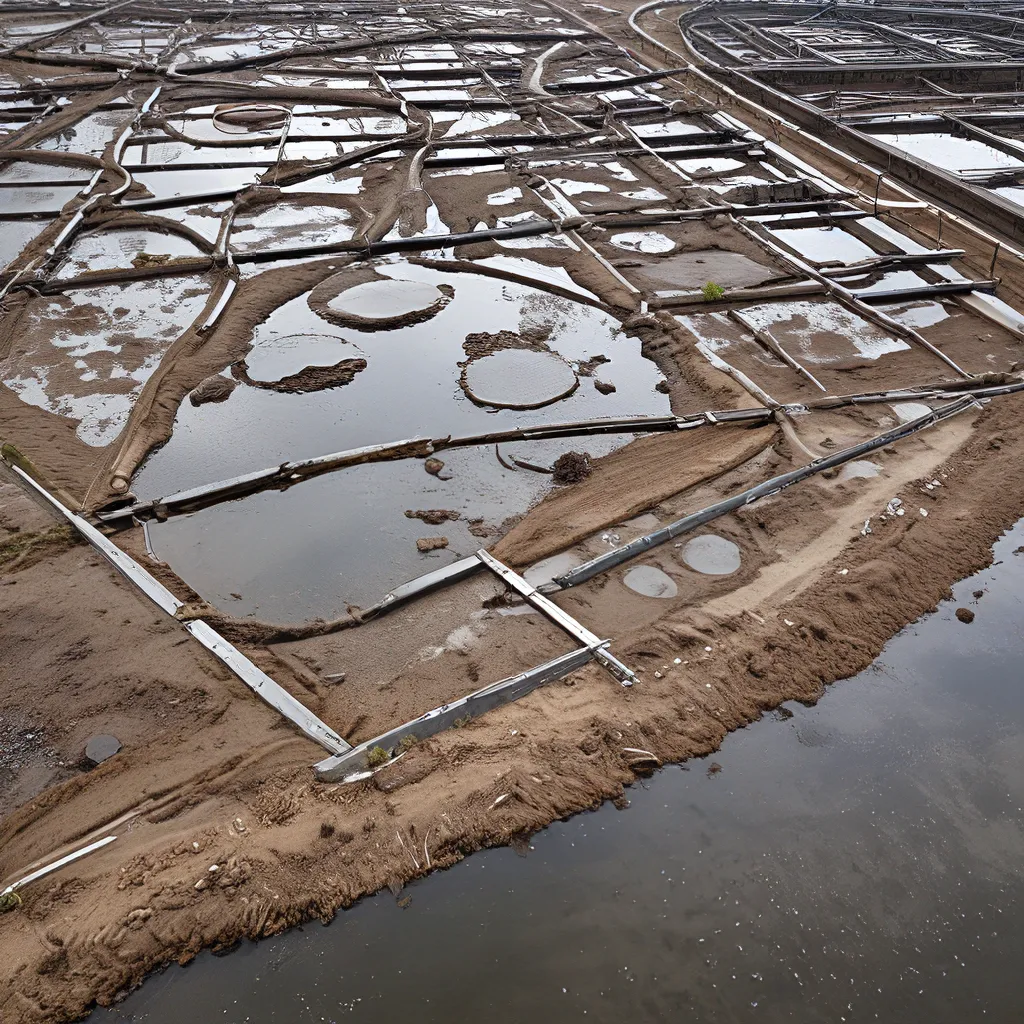
The Looming Threat: Climate Change and Its Impact on Wastewater Infrastructure
As the effects of climate change intensify, the Boston region is bracing for a surge of natural hazards that could wreak havoc on our wastewater systems. Rising sea levels, extreme precipitation, and more frequent coastal storms are all on the horizon – and they’re poised to challenge the very foundations of our water infrastructure.
Now, I know what you’re thinking – “Wastewater? Really? That’s not exactly the sexiest topic in the world.” But trust me, this is no ordinary wastewater saga. This is a story of resilience, adaptation, and the critical role that wastewater plays in shielding our communities from the devastating impacts of climate change.
Let me paint you a picture. Imagine a future where flooded streets become the norm, where sewer systems overflow with alarming regularity, and where our treatment plants struggle to keep up with the relentless onslaught of water. It’s a sobering thought, isn’t it? But that’s precisely the reality we’re facing if we don’t take bold action to fortify our wastewater infrastructure.
Wastewater: The Unsung Hero of Climate Resilience
You see, wastewater systems aren’t just about flushing and filtering – they’re the unsung heroes in the fight against climate change. These complex networks of pipes, pumps, and treatment facilities are the first line of defense against the rising tides and raging storms that are sure to come.
Think about it – when heavy rains and coastal flooding strike, it’s the wastewater system that steps up to the plate, preventing raw sewage from spilling into our streets and waterways. Without these critical assets, the consequences would be catastrophic. Imagine the public health crisis, the environmental damage, the economic disruption – it’s a nightmare scenario that we can’t afford to ignore.
But here’s the thing – our wastewater infrastructure is aging, and it’s not exactly built to withstand the ravages of climate change. Many of the systems we rely on were designed decades ago, when the climate was a bit more… well, predictable. Now, as the weather patterns become more erratic and extreme, we’re facing a race against time to retrofit and reinforce these vital assets.
Adaptation in Action: Innovative Strategies for Wastewater Resilience
So, what can we do to ensure that our wastewater systems are ready to face the challenges ahead? Well, the good news is that there are a plethora of innovative strategies and cutting-edge technologies that we can leverage to make our infrastructure more resilient.
Take, for example, the nature-based solutions that are gaining traction across the country. By incorporating green infrastructure like wetlands, permeable pavement, and bioswales, we can harness the power of nature to absorb excess water, reduce flooding, and protect our wastewater assets. It’s a win-win for the environment and our community.
And speaking of community, did you know that wastewater treatment services are playing a crucial role in engaging local stakeholders and fostering collaboration? By working hand-in-hand with municipalities, engineers, and policymakers, these service providers are helping to identify vulnerabilities, prioritize investments, and implement holistic solutions that address the unique needs of each region.
But the innovations don’t stop there. Some forward-thinking utilities are even exploring the potential of decentralized wastewater systems, which could reduce the strain on centralized infrastructure and enhance overall resilience. And let’s not forget about the cutting-edge sensor technologies that are giving us unprecedented insights into the performance and health of our wastewater networks.
Embracing the Challenge: Wastewater’s Role in a Resilient Future
As daunting as the challenge may seem, I can’t help but feel a sense of excitement about the future of wastewater and its role in building a more resilient Boston region. Because when you think about it, this isn’t just about pipes and pumps – it’s about safeguarding our communities, protecting our environment, and ensuring a brighter, more sustainable tomorrow.
And the best part? We’re not alone in this endeavor. Across the state, municipalities, agencies, and service providers are coming together to tackle these issues head-on. From the Massachusetts Hazard Mitigation and Climate Adaptation Plan to the Municipal Vulnerability Preparedness Program, there’s a groundswell of activity and a renewed commitment to making our wastewater infrastructure climate-ready.
Sure, the road ahead may be bumpy, but I’m confident that with the right strategies, the right partnerships, and the right mindset, we can meet this challenge head-on. Because when it comes to the future of our communities, the stakes are simply too high to do anything less.
Embracing the Future: Wastewater’s Role in a Resilient Boston
So, what does the future of wastewater hold for the Boston region? Well, if you ask me, it’s a future of innovation, collaboration, and unwavering resilience. It’s a future where our wastewater systems aren’t just an afterthought, but a cornerstone of our climate adaptation efforts.
And you know what? I’m not the only one who’s excited about this prospect. The Boston Region Metropolitan Planning Organization (MPO) has been leading the charge, exploring ways to incorporate climate resilience into their transportation planning and decision-making processes. They’re recognizing the critical role that wastewater infrastructure plays in protecting our region’s assets, and they’re committed to providing the technical assistance and resources that municipalities need to tackle these challenges.
But the real heroes in all of this? The wastewater service providers who are on the ground, working tirelessly to safeguard our communities. These are the folks who are leveraging the latest technologies, collaborating with local stakeholders, and pioneering innovative solutions to ensure that our wastewater systems are ready to weather the storms ahead.
And you know what? I think they’re onto something. Because when it comes to building a more resilient future, wastewater might just be the unsung hero we’ve been waiting for. So, let’s embrace the challenge, roll up our sleeves, and get to work. The future of our communities depends on it.